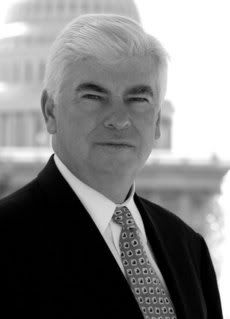[Republished with permission from The Washington Monthly]

The Myth of AQI
Fighting al-Qaeda in Iraq is the last big argument for keeping U.S. troops in the country. But the military's estimation of the threat is alarmingly wrong.By Andrew Tilghman
In March 2007, a pair of truck bombs tore through the Shiite marketplace in the northern Iraqi city of Tal Afar, killing more than 150 people. The blast reduced the ancient city center to rubble, leaving body parts and charred vegetables scattered amid pools of blood. It was among the most lethal attacks to date in the five-year-old Iraq War. Within hours, Iraqi officials in Baghdad had pinned the bombing on al-Qaeda, and news reports from Reuters, the BBC, MSNBC, and others carried those remarks around the world. An Internet posting by the terrorist group known as al-Qaeda in Iraq (AQI) took credit for the destruction. Within a few days, U.S. Army General David Petraeus publicly blamed AQI for the carnage, accusing the group of trying to foment sectarian violence and ignite a civil war. Back in Washington, pundits latched on to the attack with special interest, as President Bush had previously touted a period of calm in Tal Afar as evidence that the military's retooled counterinsurgency doctrine was working. For days, reporters and bloggers debated whether the attacks signaled a "resurgence" of al-Qaeda in the city.
Yet there's reason to doubt that AQI had any role in the bombing. In the weeks before the attack, sectarian tensions had been simmering after a local Sunni woman told Al Jazeera television that she had been gang-raped by a group of Shiite Iraqi army soldiers. Multiple insurgent groups called for violence to avenge the woman's honor. Immediately after the blast, some in uniform expressed doubts about al-Qaeda's alleged role and suggested that homegrown sectarian strife was more likely at work. "It's really not al-Qaeda who has infiltrated so much as the fact [of] what happened in 2003," said Ahmed Hashim, a professor at the Naval War College who served as an Army political adviser to the 3rd Cavalry Regiment in Tal Afar until shortly before the bombing. "The formerly dominant Sunni Turkmen majority there," he told PBS's NewsHour With Jim Lehrer soon after the bombing, "suddenly ... felt themselves having been thrown out of power. And this is essentially their revenge."
A week later, Iraqi security forces raided a home outside Tal Afar andarrested two men suspected of orchestrating the bombing. Yet when the U.S. military issued a press release about the arrests, there was no mention of an al-Qaeda connection. The suspects were never formally charged, and nearly six months later neither the U.S. military nor Iraqi police are certain of the source of the attacks. In recent public statements, the military has backed off its former allegations that al-Qaeda was responsible, instead asserting, as Lieutenant Colonel Michael Donnelly wrote in response to an inquiry from the Washington Monthly, that "the tactics used in this attack are consistent with al-Qaeda."
This scenario has become common. After a strike, the military rushes to point the finger at al-Qaeda, even when the actual evidence remains hazy and an alternative explanation—raw hatred between local Sunnis and Shiites—might fit the circumstances just as well. The press blasts such dubious conclusions back to American citizens and policy makers in Washington, and the incidents get tallied and quantified in official reports, cited by the military in briefings in Baghdad. The White House then takes the reports and crafts sound bites depicting AQI as the number one threat to peace and stability in Iraq. (In July, for instance, at Charleston Air Force Base, the president gave a speech about Iraq that mentioned al-Qaeda ninety-five times.)
By now, many in Washington have learned to discount the president's rhetorical excesses when it comes to the war. But even some of his harshest critics take at face value the estimates provided by the military about AQI's presence. Politicians of both parties point to such figures when forming their positions on the war.
All of the top three Democratic presidential candidates have argued for keeping some American forces in Iraq or the region, citing among other reasons the continued threat from al-Qaeda.But what if official military estimates about the size and impact of al-Qaeda in Iraq are simply wrong? Indeed, interviews with numerous military and intelligence analysts, both inside and outside of government, suggest that the number of strikes the group has directed represent only a fraction of what official estimates claim. Further, al-Qaeda's presumed role in leading the violence through uniquely devastating attacks that catalyze further unrest may also be overstated.
Having been led astray by flawed prewar intelligence about WMDs, official Washington wants to believe it takes a more skeptical view of the administration's information now.
Yet Beltway insiders seem to be making almost precisely the same mistakes in sizing up al-Qaeda in Iraq.[keep reading...]
Despite President Bush's near-singular focus on al-Qaeda in Iraq, most in Washington understand that instability on the ground stems from multiple sources. Numerous attacks on both U.S. troops and Iraqi civilians have been the handiwork of Shiite militants, often connected to, or even part of, the Iraqi government. Opportunistic criminal gangs engage in some of the same heinous tactics.
The Sunni resistance is also comprised of multiple groups. The first consists of so-called "former regime elements." These include thousands of ex-officers from Saddam's old intelligence agency, the Mukabarat, and from the elite paramilitary unit Saddam Fedayeen. Their primary goal is to drive out the U.S. occupation and install a Sunni-led government hostile to Iranian influence. Some within this broad group support reconciliation with the current government or negotiations with the United States, under the condition that American forces set a timetable for a troop withdrawal.
The second category consists of homegrown Iraqi Sunni religious groups, such as the Mujahadeen Army of Iraq. These are native Iraqis who aim to install a religious-based government in Baghdad, similar to the regime in Tehran. These groups use religious rhetoric and terrorist tactics but are essentially nationalistic in their aims.
Al-Qaeda in Iraq comprises the third group. The terrorist network was founded in 2003 by the now-dead Jordanian militant Abu Musab al-Zarqawi. (The extent of the group's organizational ties to Osama bin Laden's al-Qaeda is hotly debated, but the organizations share a worldview and set of objectives.) AQI is believed to have the most non-Iraqis in its ranks, particularly among its leadership. However, most recent assessments say the rank and file are mostly radicalized Iraqis. AQI, which calls itself the "Islamic State of Iraq," espouses the most radical form of Islam and calls for the imposition of strict sharia, or Islamic law. The group has no plans for a future Iraqi government and instead hopes to create a new Islamic caliphate with borders reaching far beyond Mesopotamia.
The essential questions are: How large is the presence of AQI, in terms of manpower and attacks instigated, and what role does the group play in catalyzing further violence? For the first question, the military has produced an estimate. In a background briefing this July in Baghdad, military officials said that during the first half of this year AQI accounted for 15 percent of attacks in Iraq. That figure was also cited in the military intelligence report during final preparations for a National Intelligence Estimate in July.
This is the number on which many military experts inside the Beltway rely. Michael O'Hanlon, a senior fellow in foreign policy studies at the Brookings Institution who attended the Baghdad background briefing, explained that he thought the estimate derived from a comprehensive analysis by teams of local intelligence agents who examine the type and location of daily attacks, and their intended targets, and crosscheck that with reports from Iraqi informants and other data, such as intercepted phone calls. "It's a fairly detailed kind of assessment," O'Hanlon said. "Obviously you can't always know who is behind an attack, but there is a fairly systematic way of looking at the attacks where they can begin to make a pretty informed guess."
Yet those who have worked on estimates inside the system take a more circumspect view. Alex Rossmiller, who worked in Iraq as an intelligence officer for the Department of Defense, says that real uncertainties exist in assigning responsibility for attacks. "It was kind of a running joke in our office," he recalls. "We would sarcastically refer to everybody as al-Qaeda."
To describe AQI's presence, intelligence experts cite a spectrum of estimates, ranging from 8 percent to 15 percent. The fact that such "a big window" exists, says Vincent Cannistraro, former chief of the CIA's Counterterrorism Center, indicates that "[those experts] really don't have a very good perception of what is going on."
It's notable that military intelligence reports have opted to cite a figure at the very top of that range. But even the low estimate of 8 percent may be an overstatement, if you consider some of the government's own statistics.
The first instructive set of data comes from the U.S.-sponsored Radio Free Europe/Radio Liberty. In March, the organization analyzed the online postings of eleven prominent Sunni insurgent groups, including AQI, tallying how many attacks each group claimed. AQI took credit for 10 percent of attacks on Iraqi security forces and Shiite militias (forty-three out of 439 attacks), and less than 4 percent of attacks on U.S. troops (seventeen out of 357). Although these Internet postings should not be taken as proof positive of the culprits, it's instructive to remember that PR-conscious al-Qaeda operatives are far more likely to overstate than understate their role.
When turning to the question of manpower, military officials told the New York Times in August that of the roughly 24,500 prisoners in U.S. detention facilities in Iraq (nearly all of whom are Sunni), just 1,800—about 7 percent—claim allegiance to al-Qaeda in Iraq. Moreover, the composition of inmates does not support the assumption that large numbers of foreign terrorists, long believed to be the leaders and most hard-core elements of AQI, are operating inside Iraq. In August, American forces held in custody 280 foreign nationals—slightly more than 1 percent of total inmates.
The State Department's Bureau of Intelligence and Research (INR), which arguably has the best track record for producing accurate intelligence assessments, last year estimated that AQI's membership was in a range of "more than 1,000." When compared with the military's estimate for the total size of the insurgency—between 20,000 and 30,000 full-time fighters—this figure puts AQI forces at around 5 percent. When compared with Iraqi intelligence's much larger estimates of the insurgency—200,000 fighters—INR's estimate would put AQI forces at less than 1 percent. This year, the State Department dropped even its base-level estimate, because, as an official explained, "the information is too disparate to come up with a consensus number."
How big, then, is AQI? The most persuasive estimate I've heard comes from Malcolm Nance, the author of The Terrorists of Iraq and a twenty-year intelligence veteran and Arabic speaker who has worked with military and intelligence units tracking al-Qaeda inside Iraq. He believes AQI includes about 850 full-time fighters, comprising 2 percent to 5 percent of the Sunni insurgency. "Al-Qaeda in Iraq," according to Nance, "is a microscopic terrorist organization."
So how did the military come up with an estimate of 15 percent, when government data and many of the intelligence community's own analysts point to estimates a fraction of that size? The problem begins at the top. When the White House singles out al-Qaeda in Iraq for special attention, the bureaucracy responds by creating procedures that hunt down more evidence of the organization. The more manpower assigned to focus on the group, the more evidence is uncovered that points to it lurking in every shadow. "When you have something that is really hot, the leaders start tasking everyone to look into that," explains W. Patrick Lang, a retired U.S. Army colonel and former head of Middle East intelligence analysis for the Department of Defense. "Whoever is at the top of the pyramid says, 'Make me a briefing showing what al-Qaeda in Iraq is doing,' and then the decision maker says, 'Aha, I knew I was right.'"
With disproportionate resources dedicated to tracking AQI, the search has become a self-reinforcing loop. The Army has a Special Operations task force solely dedicated to tracking al-Qaeda in Iraq. The Defense Intelligence Agency tracks AQI through its Iraq office and its counterterrorism office. The result is more information culled, more PowerPoint slides created, and, ultimately, more attention drawn to AQI, which amplifies its significance in the minds of military and intelligence officers. "Once people look at everything through that lens, al-Qaeda is all they see," said Larry Johnson, a former CIA officer who also worked at the U.S. State Department's Office of Counterterrorism. "It sort of becomes a self-fulfilling prophecy."
Ground-level analysts in the field, facing pressures from superiors to document AQI's handiwork, might be able to question such assumptions if they had strong intelligence networks on the ground. Unfortunately, that's rarely the case. The intelligence community's efforts are hobbled by too few Arabic speakers in their ranks and too many unreliable informants in Iraqi communities, rendering a hazy picture that is open to interpretations.
Because uncertainty exists, the bar for labeling an attack the work of al-Qaeda can be very low. The fact that a detainee possesses al-Qaeda pamphlets or a laptop computer with cached jihadist Web sites, for example, is at times enough for analysts to link a detainee to al-Qaeda. "Sometimes it's as simple as an anonymous tip that al-Qaeda is active in a certain village, so they will go out on an operation and whoever they roll up, we call them al-Qaeda," says Alex Rossmiller. "People can get labeled al-Qaeda anywhere along in the chain of events, and it's really hard to unlabel them." Even when the military backs off explicit statements that AQI is responsible, as with the Tal Afar truck bombings, the perception that an attack is the work of al-Qaeda is rarely corrected.
The result can be baffling for the troops working on the ground, who hear the leadership characterizing the conflict in Iraq in ways that do not necessarily match what they see in the dusty and danger-laden villages. Michael Zacchea, a lieutenant colonel in the Marine Reserves who was deployed to Iraq, said he was sometimes skeptical of upper-level analysis emphasizing al-Qaeda in Iraq rather than the insurgency's local roots. "It's very, very frustrating for everyone involved who is trying to do the right thing," he said. "That's not how anyone learned to play the game when we were officers coming up the ranks, and we were taught to provide clear battlefield analysis."
Even if the manpower and number of attacks attributed to AQI have been exaggerated—and they have—many observers maintain that what is uniquely dangerous about the group is not its numbers, but the spectacular nature of its strikes. While homegrown Sunni and Shiite militias engage for the most part in tit-for-tat violence to forward sectarian ends, AQI's methods are presumed to be different—more dramatic, more inflammatory, and having a greater ripple effect on the country's fragile political environment. "The effect of al-Qaeda has been far beyond the numbers that they field," explains Thomas Donnelly, resident fellow for defense and national security at the American Enterprise Institute in Washington. "The question is, What attacks are likely to have the most destabilizing political and strategic affects?" He points, as do many inside the administration, to the February 2006 bombing of the Golden Mosque in Samara, a revered Shiite shrine, as a paramount example of AQI's outsize influence. President Bush has laid unqualified blame for the Samara bombing on al-Qaeda, and described the infamous incident—and ensuing sectarian violence—as a fatal tipping point toward the current unrest.
But is this view of AQI's vanguard role in destabilizing Iraq really true? There are three reasons to question that belief.
First, although spectacular attacks were a distinctive AQI hallmark early in the war, the group has since lost its monopoly on bloody fireworks. After five years of shifting alliances, cross-pollination of tactics, and copycat attacks, other insurgent groups now launch equally dramatic and politically charged attacks. For example, a second explosion at the Samara mosque in June 2007, which destroyed the shrine's minarets and sparked a wave of revenge attacks on Sunni mosques nationwide, may have been an inside job. U.S. military officials said fifteen uniformed men from the Shiite-run Iraqi Security Forces were arrested for suspected involvement in the attack.
Second, it remains unclear whether the original Samara bombing was itself the work of AQI. The group never took credit for the attack, as it has many other high-profile incidents. The man who the military believe orchestrated the bombing, an Iraqi named Haitham al-Badri, was both a Samara native and a former high-ranking government official under Saddam Hussein. (His right-hand man, Hamed Jumaa Farid al-Saeedi, was also a former military intelligence officer in Saddam Hussein's army.) Key features of the bombing did not conform to the profile of an AQI attack. For example, the bombers did not target civilians, or even kill the Shiite Iraqi army soldiers guarding the mosque, both of which are trademark tactics of AQI. The planners also employed sophisticated explosive devices, suggesting formal military training common among former regime officers, rather than the more bluntly destructive tactics typical of AQI. Finally, Samara was the heart of Saddam's power base, where former regime fighters keep tight control over the insurgency. Frank "Greg" Ford, a retired counterintelligence agent for the Army Reserves, who worked with the Army in Samara before the 2006 bombing, says that the evidence points away from AQI and toward a different conclusion: "The Baathists directed that attack," says Ford.
Third, while some analysts believe that AQI drafts Baathist insurgents to carry out its attacks, other intelligence experts think it is the other way around. In other words, they see evidence of native insurgent forces coopting the steady stream of delusional extremists seeking martyrdom that AQI brings into Iraq. "Al-Qaeda can't operate anywhere in Iraq without kissing the ring of the former regime," says Nance. "They can't move car bombs full of explosives and foreign suicide bombers through a city without everyone knowing who they are. They need to be facilitated." Thus new foreign fighters "come through and some local Iraqis will say, 'Okay, why don't you go down to the Ministry of Defense building downtown.'" AQI recruits often find themselves taking orders from a network of former regime insurgents, who assemble their car bombs and tell them what to blow up. They become, as Nance says, "puppets for the other insurgent groups."
The view that AQI is neither as big nor as lethal as commonly believed is widespread among working-level analysts and troops on the ground. A majority of those interviewed for this article believe that the military's AQI estimates are overblown to varying degrees. If such misgivings are common, why haven't doubts pricked the public debate? The reason is that alternate views are running up against an echo chamber of powerful players all with an interest in hyping AQI's role.
The first group that profits from an outsize focus on AQI are former regime elements, and the tribal chiefs with whom they are often allied. These forces are able to carry out attacks against Shiites and Americans, but also to shift the blame if it suits their purposes. While the U.S. military has recently touted "news" that Sunni insurgents have turned against the al-Qaeda terrorists in Anbar Province, there is little evidence of actual clashes between these two groups. Sunni insurgents in Anbar have largely ceased attacks on Americans, but some observers suggest that this development has less to do with vanquishing AQI than with the fact that U.S. troops now routinely deliver cash-filled duffle bags to tribal sheiks serving as "lead contractors" on "reconstruction projects." The excuse of fighting AQI comes in handy. "Remember, Iraq is an honor society," explains Juan Cole, an Iraq expert and professor of modern Middle Eastern studies at the University of Michigan. "But if you say it wasn't us—it was al-Qaeda—then you don't lose face."
The second benefactor is the government of Prime Minister Nouri al-Maliki, often the first to blame specific attacks on AQI. Talking about "al-Qaeda" offers the government a politically correct way of talking about Sunni violence without seeming to blame the Sunnis themselves, to whom they are ostensibly trying to reach out in a unity government. On a deeper level, however, the al-Maliki regime has very limited popular support, and the government officials and ruling Islamic Dawa Party feel an imperative to include Iraqi troubles in the broader "global war in terrorism" in order to keep U.S. troops in the country. In June, when faced with increasingly uncomfortable pressure from the Americans for his failure to resolve key political issues, al-Maliki warned that Iraqi intelligence had found evidence of a "widespread and dangerous plan by the terrorist al-Qaeda organization" to mount attacks outside of Iraq.
Elsewhere within the Shiite bloc of Iraqi politics, Moqtada al-Sadr has his own reasons for playing up the idea of AQI. "The Sadrists want to overstate the role of al-Qaeda in a way to emphasize on the 'foreignness' of the current problem in Iraq; and this easily fits their anti-occupation ideology, which seems to gain more popularity among Shia Iraqis on a daily basis," said Babak Rahimi, a professor of Islamic Studies and expert in Shiite politics at the University of California at San Diego.
Bin Laden and his deputy, Ayman al-Zawahiri, remain eager to take credit for the violence in Iraq, despite the bad blood that existed between bin Laden and AQI's slain founder, al-Zarqawi. They've produced a long series of taped statements in recent years taunting U.S. leaders and attempting to conflate their operations with the Sunni resistance in Iraq. "They want to bring this all together as a motivating tool to encourage recruitment," said Farhana Ali, a terrorism expert at the RAND Corporation.
The press has also been complicit in inflating the threat of AQI. Because of the danger on the ground, reporters struggle to do the kind of comprehensive field reporting that's necessary to check facts and question statements from military spokespersons and Iraqi politicians. Today, for example, U.S. reporters rarely travel independently outside central Baghdad. Few, if any, insurgents have ever given interviews to Western reporters. These limitations are understandable, if unfortunate. But news organizations are reluctant to admit their confines in obtaining information. Ambiguities are glossed over; allegations are presented as facts. Besides, it's undeniably in the reporter's own interest to keep "al-Qaeda attacks" in the headline, because it may move their story from A16 to A1.
Finally, no one has more incentive to overstate the threat of AQI than President Bush and those in the administration who argue for keeping a substantial military presence in Iraq. Insistent talk about AQI aims to place the Iraq War in the context of the broader war on terrorism. Pointing to al-Qaeda in Iraq helps the administration leverage Americans' fears about terrorism and residual anger over the attacks of September 11. It is perhaps one of the last rhetorical crutches the president has left to lean on.
This is not to say that al-Qaeda in Iraq doesn't pose a real danger, both to stability in Iraq and to security in the United States. Today multiple Iraqi insurgent groups target U.S. forces, with the aim of driving out the occupation. But once our troops withdraw, most Sunni resistance fighters will have no impetus to launch strikes on American soil. In that regard, al-Qaeda—and AQI, to the extent it is affiliated with bin Laden's network—is unique. The group's leadership consists largely of foreign fighters, and its ideology and ambitions are global. Al-Qaeda fighters trained in Baghdad may one day use those skills to plot strikes aimed at Boston.
Yet it's not clear that the best way to counter this threat is with military action in Iraq. AQI's presence is tolerated by the country's Sunni Arabs, historically among the most secular in the Middle East, because they have a common enemy in the United States. Absent this shared cause, it's not clear that native insurgents would still welcome AQI forces working to impose strict sharia. In Baghdad, any near-term functioning government will likely be an alliance of Shiites and Kurds, two groups unlikely to accept organized radical Sunni Arab militants within their borders. Yet while precisely predicting future political dynamics in Iraq is uncertain, one thing is clear now: the continued American occupation of Iraq is al-Qaeda's best recruitment tool, the lure to hook new recruits. As RAND's Ali said, "What inspires jihadis today is Iraq."
Five years ago, the American public was asked to support the invasion of Iraq based on the false claim that Saddam Hussein was somehow linked to al-Qaeda. Today, the erroneous belief that al-Qaeda's franchise in Iraq is a driving force behind the chaos in that country may be setting us up for a similar mistake.
Andrew Tilghman was an Iraq correspondent for the Stars and Stripes newspaper in 2005 and 2006. He can be reached at tilghman.andrew@gmail.com.
There's more:
"The Myth of AQI" >>








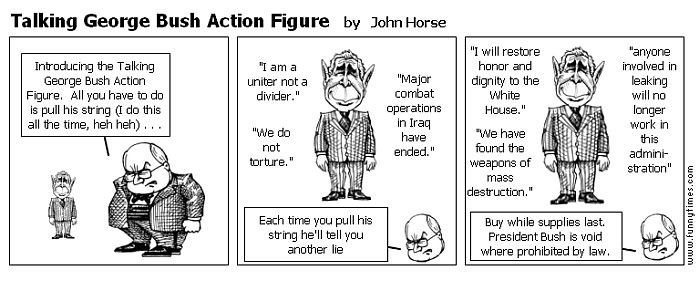
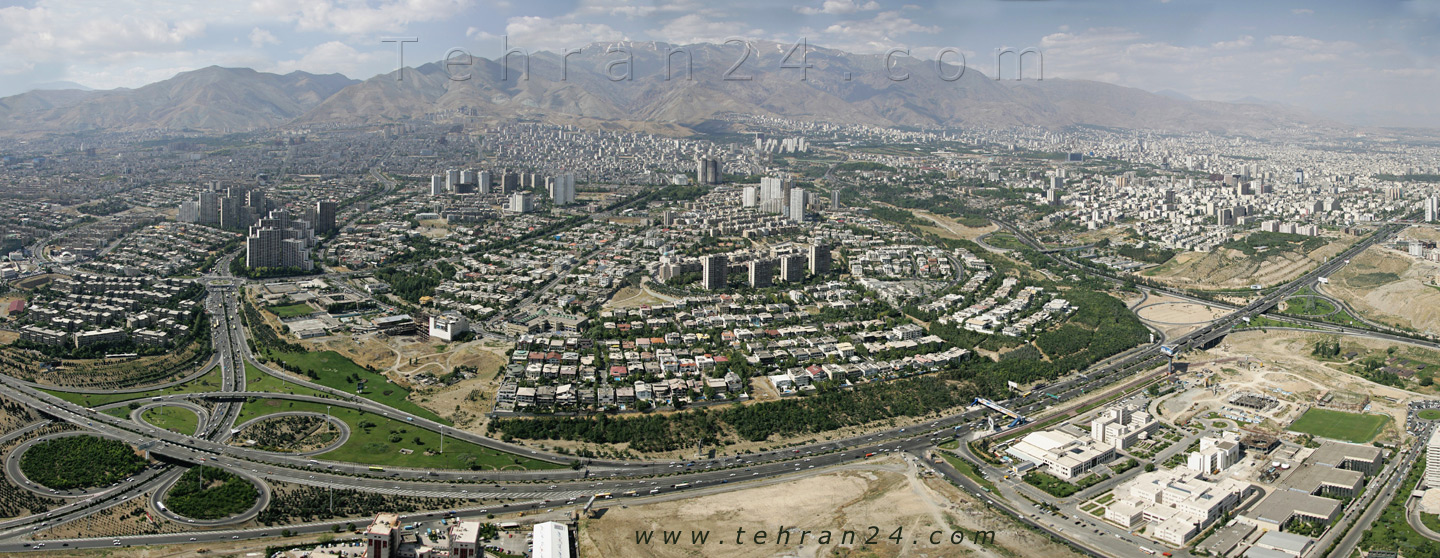
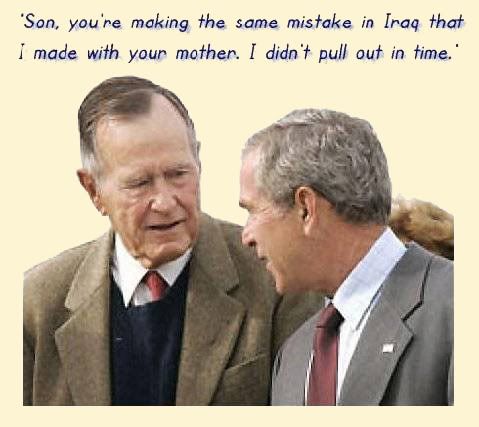
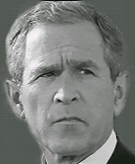 The "Hitler comparison" should be shouted from the rooftops, as should the Goebbels comparison, the Himmler comparison, the Mengele, Stalin, Torquemada, Beelzebub comparisons and all the rest. If it struts like a Nazi, talks like Nazi, tortures like a Nazi and wages aggressive and illegal war like a Nazi... it's not a duck.
The "Hitler comparison" should be shouted from the rooftops, as should the Goebbels comparison, the Himmler comparison, the Mengele, Stalin, Torquemada, Beelzebub comparisons and all the rest. If it struts like a Nazi, talks like Nazi, tortures like a Nazi and wages aggressive and illegal war like a Nazi... it's not a duck.
